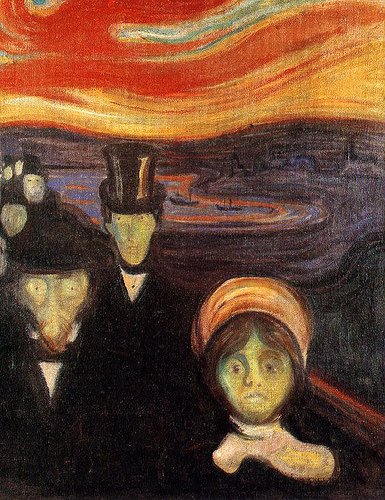One of a series of articles published in The Guardian

[...] The first thing to grasp is that anxiety does not mean ceaselessly fretting or fitfully worrying about something or other. On the contrary, Heidegger says that anxiety is a rare and subtle mood and in one place he even compares it a feeling of calm or peace. It is in anxiety that the free, authentic self first comes into existence. It was, of course, the mood that launched a thousand existentialist novels, most famously Sartre's Nausea and Camus's The Outsider (although Heidegger was very critical of existentialism).
In order to understand what Heidegger means by anxiety, we have to distinguish it from another mood he examines: fear. Heidegger gives a phenomenology of fear earlier in Being and Time. His claim is that fear is always fear of something threatening, some particular thing in the world. Let's say that I am fearful of spiders. Fear has an object and when that object is removed, I am no longer fearful. I see a spider in the bath and I am suddenly frightened. My non-spider fearing friend removes the offending arachnid, I am no longer fearful.
Matters are very different with anxiety. If fear is fearful of something particular and determinate, then anxiety is anxious about nothing in particular and is indeterminate. If fear is directed towards some distinct thing in the world, spiders or whatever, then anxiety is anxious about being-in-the-world as such. Anxiety is experienced in the face of something completely indefinite. It is, Heidegger insists, "nothing and nowhere".
Read part one: 'Being and Time, part 1: Why Heidegger matters'.
Read part two: 'Being and Time, part 2: On 'mineness''.
Read part three: 'Being and Time, part 3: Being-in-the-world'.
Read part four: 'Being and Time, part 4: 'Thrown into this world'.


